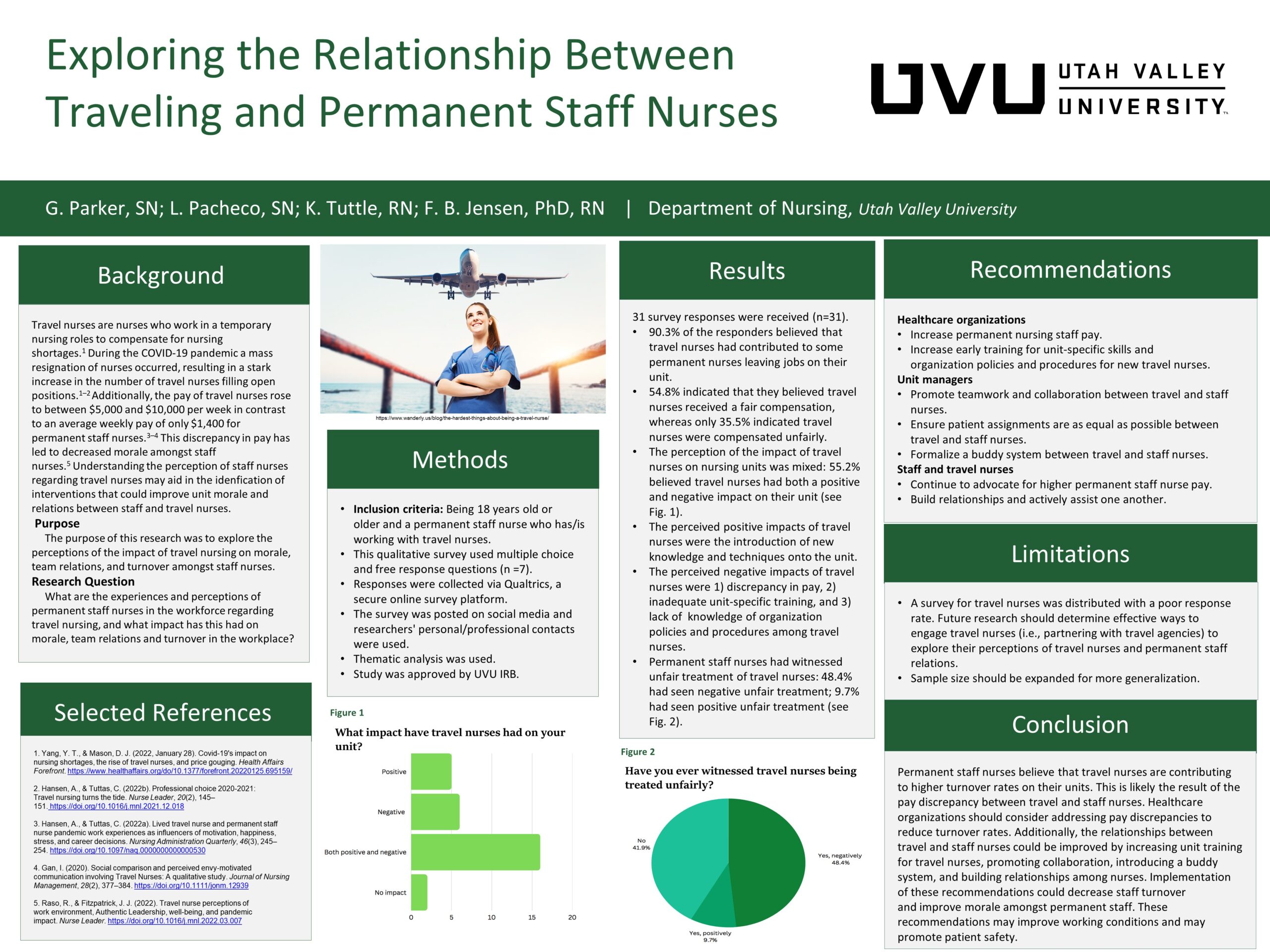Presenter Name: Lauren Pacheco
Additional Presenters:
Garrett Parker (10619833@uvu.edu)
Description
Background and Significance
Travel nurses are registered nurses who work in a non-permanent or temporary nursing role. They are usually employed by an independent nursing staffing agency instead of one facility. They are usually assigned to one hospital for 13 weeks (Hansen & Tuttas, 2022b). Travel nursing was initiated in the 1980s to address inadequate staffing in healthcare facilities with nursing shortages (Yang & Mason, 2022). During the COVID-19 pandemic an unprecedented increase in demand for nurses occurred alongside a mass resignation of 534,000 healthcare workers in what has become known as ""The Great Resignation"", resulting in an RN vacancy rate of 8% nationwide (Hansen & Tuttas, 2022b). Prior to the pandemic travel nurses comprised less than 2% of the nursing population, but in 2020 the number of travel nurses increased by 35% in an effort to address the mass nursing shortage from the pandemic (Yang & Mason, 2022). In 2018 staff nurses earned an estimated average salary of $1,400 per week, whereas travel nurses were paid between $5,000 to $10,000 per week during the pandemic as their average salary rose by 25%. This discrepancy in pay has led to reported animosity between permanent staff nurses and travel nurses (Hansen & Tuttas, 2022a; Gan, 2020). This animosity has also led to a decrease in overall morale among nurses and a decrease in well-being, particularly for travel nurses, with reports indicating that 70% of travel nurses are at risk for poor mental well-being (Raso & Fitzpatrick, 2022). This animosity may contribute to a higher turnover rate for nurses. Understanding the experiences of staff nurses who work and interact with travel nurses could help guide future research to identify interventions to improve team relations between travel nurses and permanent staff nurses. To explore these experiences, a survey with questions about perceptions of travel nurses from the perspective of permanent staff nurses was performed (n = 31). An analysis of these responses demonstrated that almost all staff nurses believe that travel nurses have contributed to some staff nurses leaving their job on their units. Staff nurses had mixed reactions to the overall impact of travel nurses with more than half believing the travel nurses had a mixed (both positive and negative) impact on their units. The negative impacts were generally perceived to be a lack of training and unit knowledge amongst travel nurses, and an excessive pay discrepancy between travel and staff nurses. The positive impacts were perceived to be the introduction of new knowledge and techniques onto the unit. Based on these results, we recommend that travel nurses receive more extensive training on their new units and increase permanent staff pay to improve unit and staff morale.
Travel nurses are registered nurses who work in a non-permanent or temporary nursing role. They are usually employed by an independent nursing staffing agency instead of one facility. They are usually assigned to one hospital for 13 weeks (Hansen & Tuttas, 2022b). Travel nursing was initiated in the 1980s to address inadequate staffing in healthcare facilities with nursing shortages (Yang & Mason, 2022). During the COVID-19 pandemic an unprecedented increase in demand for nurses occurred alongside a mass resignation of 534,000 healthcare workers in what has become known as ""The Great Resignation"", resulting in an RN vacancy rate of 8% nationwide (Hansen & Tuttas, 2022b). Prior to the pandemic travel nurses comprised less than 2% of the nursing population, but in 2020 the number of travel nurses increased by 35% in an effort to address the mass nursing shortage from the pandemic (Yang & Mason, 2022). In 2018 staff nurses earned an estimated average salary of $1,400 per week, whereas travel nurses were paid between $5,000 to $10,000 per week during the pandemic as their average salary rose by 25%. This discrepancy in pay has led to reported animosity between permanent staff nurses and travel nurses (Hansen & Tuttas, 2022a; Gan, 2020). This animosity has also led to a decrease in overall morale among nurses and a decrease in well-being, particularly for travel nurses, with reports indicating that 70% of travel nurses are at risk for poor mental well-being (Raso & Fitzpatrick, 2022). This animosity may contribute to a higher turnover rate for nurses. Understanding the experiences of staff nurses who work and interact with travel nurses could help guide future research to identify interventions to improve team relations between travel nurses and permanent staff nurses. To explore these experiences, a survey with questions about perceptions of travel nurses from the perspective of permanent staff nurses was performed (n = 31). An analysis of these responses demonstrated that almost all staff nurses believe that travel nurses have contributed to some staff nurses leaving their job on their units. Staff nurses had mixed reactions to the overall impact of travel nurses with more than half believing the travel nurses had a mixed (both positive and negative) impact on their units. The negative impacts were generally perceived to be a lack of training and unit knowledge amongst travel nurses, and an excessive pay discrepancy between travel and staff nurses. The positive impacts were perceived to be the introduction of new knowledge and techniques onto the unit. Based on these results, we recommend that travel nurses receive more extensive training on their new units and increase permanent staff pay to improve unit and staff morale.
University / Institution: Utah Valley University
Type: Poster
Format: In Person
Presentation #D52
SESSION D (3:30-5:00PM)
Area of Research: Nursing
Email: 10815003@uvu.edu
Faculty Mentor: Francine Jensen

